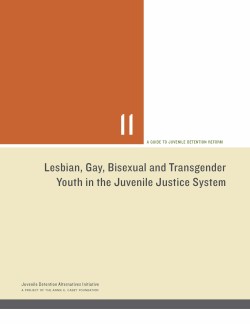
This groundbreaking publication documents the vulnerability of LGBTQ youth in our communities and in juvenile justice systems. Social stigma, family rejection, and discrimination subject LGBTQ youth to increased risk of substance use, homelessness, school exclusion, depression and suicidality. These risks are well-documented and devastating, and drive disproportionate numbers of LGBTQ youth into the justice system.
Studies show that up to 20 percent of youth in America’s juvenile detention facilities identify as LGBT, questioning or gender nonconforming, which far exceeds their estimated number in the general population. Data also show that LGB youth confined in juvenile facilities are at least seven times more likely to be sexually assaulted by other youth as are their heterosexual peers.
The significant overrepresentation and documented vulnerability of LGBTQ youth in the juvenile justice system has prompted recent changes in law and policy that significantly impact practice. The Prison Rape Elimination Act, as well as recent case law and emerging professional standards, have created important protections of LGBTQ youth and new expectations of juvenile justice personnel. Implementation of these new requirements, however, varies widely across the country and there is a demand for clear professional guidance. This practice guide is a response to that demand.
The practice guide includes:
- Accurate information about sexual orientation, gender identity, and gender expression
- Research on the impact of family rejection and societal bias on the health and well-being of LGBTQ youth, the drivers that contribute to their disproportionate contact with the justice system, and the harmful and unfair practices to which they are subjected in the system
- Recommended policies and procedures to prohibit discrimination, prevent harm, and promote the health and well-being of LGBTQ youth who are involved in the juvenile justice system
- Recommended policies and procedures to meet legal and professional standards governing the detention of LGBTQ youth
LGBTQ youth are harmed every day in our nation’s juvenile justice systems. This practice guide provides the tools to immediately begin the urgent process of creating systems in which all young people—irrespective of sexuality and gender—are treated with fairness and respect.
Download the guide here.
